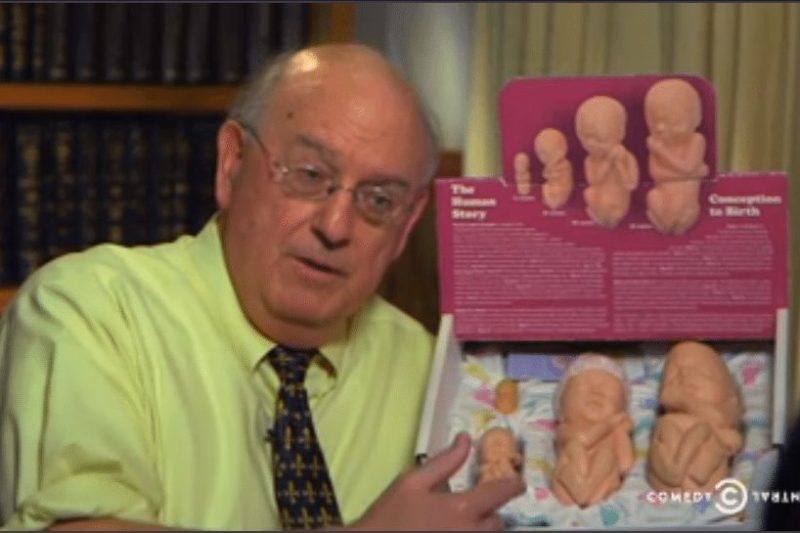The Absurdity of Alabama’s ‘Lawyers for Fetuses’ Law
On last night’s episode of The Daily Show, Jessica Williams asked civil rights attorney Julian McPhillips to help her understand the new cottage industry of fetal legal representation. The results were, predictably, hilarious.

Thanks to a new law passed last year, fetal legal representation may become a new cottage industry in Alabama. And on last night’s episode of The Daily Show, Jessica Williams asked civil rights attorney Julian McPhillips to help her understand this potential growth industry.
The results were, predictably, hilarious.
But let’s backtrack a bit, because you need to understand just how ridiculous it is that Alabama has passed a law and set aside state funds so that fetuses can sue their hosts.
In Alabama, as in many states, if a minor wants to get an abortion, she needs parental consent. If she wants to proceed with an abortion without it—because either her parents refuse to consent or she doesn’t want to tell her parents about the pregnancy at all—she can petition the court for a waiver. It’s called “judicial bypass.”
The whole point of judicial bypass is to allow a minor to participate in confidential proceedings where a judge will ask her a bunch of questions to determine whether she’s mature enough to decide to get an abortion on her own. If the court determines that, no, this child is not mature enough to decide to terminate an unwanted pregnancy, then it will decide that the child is, apparently, mature enough to be a parent.
If it sounds illogical, that’s because it is.
Last year, though, Alabama took “illogical” to a whole other level. Legislators passed a law that allows the court to appoint a lawyer for the fetus, so that when the judge decides whether or not to waive the consent requirement for the child, the interests of the child’s fetus will be represented.
Yes, that’s right. In Alabama, a fetus can call witnesses to testify against its carrier—because let’s face it, at this point a pregnant woman is being treated as nothing more than a vessel—in order to force her to continue to carry it.
If you think it sounds like the weirdest landlord/tenant dispute you’ve ever heard of, you’re not too far off.
And here’s the kicker: If the court decides to grant the minor permission to get an abortion without parental consent, the lawyer for the fetus may appeal the decision.
This “lawyers for fetuses” trend is not new. State court judges in Alabama had been appointing lawyers for fetuses for years, as Molly Redden pointed out in an article for Mother Jones. But this new legislation enshrines into law what had previously been merely an eccentric practice of some state judges. One such judge, Walter Mark Anderson III, had appointed Julian McPhillips to represent fetuses in dozens of judicial bypass proceedings in his court—the same Julian McPhillips who was so evidently irritated by Jessica Williams’ questioning during The Daily Show segment.
But in Williams’ defense, the questions she posed to McPhillips were far less offensive than the ones that McPhillips apparently poses to the teenagers he cross-examines in court.
Via Mother Jones, here’s part of McPhillips’ cross-examination of a 17-year-old girl on behalf of her fetus—which McPhillips creepily dubbed “Baby Ashley”:
MCPHILLIPS: You say that you are aware that God instructed you not to kill your own baby, but you want to do it anyway? And are you saying here today that notwithstanding everything that you want to interfere with God’s plan for your baby?
MINOR: I think that is between me and God.
MCPHILLIPS: And you are not concerned after you have had the abortion that some day you may wake up and say my gosh, what have I done to my own baby?
MINOR: It may happen.
MCPHILLIPS: You are not worried about being haunted by this? Here you have the chance to save the life of your own baby … And still you want to go ahead and snuff out the life of your own baby?
MINOR: Yes.
In the “Baby Ashley” case, after the court granted the consent waiver, McPhillips appealed the decision on the fetus’ behalf. (Because that’s not weird at all.) As reported by Mother Jones, the appeals court ruled that a fetus couldn’t appeal. And why should they be able to appeal? It makes no sense to appoint a lawyer to a fetus in the first place.
Now that Alabama has passed a law that specifically permits the fetus to appeal, though, sense has been summarily tossed out the window.
The law is HB 494, and you can read a summary of it in Rewire‘s handy-dandy database, Rewire Data. You can (and should) also read Jessica Mason Pieklo’s extensive report on the law.
And finally, you can watch Jessica Williams’ interview with Julian McPhillips below because we have to laugh in order to keep from stabbing:
You’re welcome.
